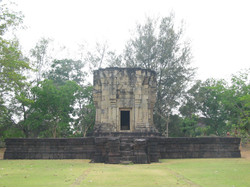Artwork Search
Arts in Southeast Asia Database
Prasat Ban Phlong
Keywords : Shiva, Baphuon, Prasat Narai Cheng Weng, Prasat Ta Muen Thom, Prasat Sa Kamphaeng Yai
| Site common name | Prasat Ban Phlong |
|---|---|
| Type of artwork | Architecture |
| Sub district | Ban Phluang |
| District | Prasat |
| Province | Surin |
| Region | Northeast |
| Country | Thailand |
| Geographic Coordinates Decimal degree | Lat : 14.610251 Long : 103.424447 |
| Geographic Coordinates UTM | Zone : 48 P Hemisphere : N E : 330252.19 N : 1615807.13 |
| Place of artwork | The only prasat that is facing east |
| History of production | No evidence related to the establishing history |
|---|---|
| Production process | No evidence related to the establishing history |
| Art | It is a small single prasat built from sandstone located on a large cross-shaped Phaitee laterite base. The fact that the laterite base has two wings which are much larger than the prasat itself can assume that that there might be a plan to build a surrounding prasats. However, those prasats are not in existence nowadays. It is unknown whether the prasats had never been completed or they were built with wood, so they had all been lost. This is an example of a small prasat with quite complete carvings. The main entrance is in the east while the other three are false doors. The prasat has beautiful engravings in Baphuon Arts both on the lintel and the gable. Therefore, the age of the prasat can be assumed to be around the late 16th century B.E to the early 17th century B.E. The peak of the prasat might be built with bricks but it was lost over time. The lintel of this prasat usually consists of a Kala face sticking out a triangular tongue to the front and spitting out a garland and this is a typical Baphuon style. Sometimes there is a bunch of flowers to separate the crescent lintel and sometimes there are none. This proves that the crescent and non-crescent lintels are popular in contemporary times. The gable is in Baphuon style. It is in a shape of a flower stalk facing downward. There is a Naga with a visor. Inside of the gable composed of flora patterns with a Kala face underneath. With the appearing visor, it may be possible that this prasat is in the late Baphuon period and its age may be slightly later than Prasat Khao Phra Viharn and Prasat Mueang Tum. Both the gable and the lintel of this prasat show images of Krishna in various episodes such as Krishna lifting the Kovanthana mountain and Krishna subdued Naga Kaliya. In addition, the images of Indra on the Erawan elephant also appeared in several areas. |
| Key academic information | It is an example of a religious site in Khmer culture that was built around late 16th century. |
| Period | Historical Period |
| Art period | Lopburi, Baphuon |
| Age | Late 16th century B.B. – Early 17th century B.E. |
| Religion | Brahmanism-Hinduism |
| Sect | Shaivite |
| Religion and belief | Shaivism in Brahminism |
| Related artwork | Prasat Ta Muen Thom |
| Type of License | Attribution-NonCommercial-NoDerivs (CC BY-NC-ND) |
|---|---|
| Rights | Princess Maha Chakri Sirindhorn Anthropology Centre |
| Date of record creation | 2016-06-02 |
| Record creator | Rungroj Thamrungraeng |
| Bibliography | เฉลิมเกียรติ กิจตระกูลรัตน์. ปราสาทบ้านหินพลวง ตำบลกังแอง อำเภอปราสาท จังหวัดสุรินทร์. สารนิพนธ์หลักสูตรศิลปศาสตรบัณฑิต ภาควิชาโบราณคดี บัณฑิตวิทยาลัย มหาวิทยาลัยศิลปากร, 2528. สุริยวุฒิ สุขสวัสดิ์, ม.ร.ว. บรรณาธิการ. ปราสาทหินและทับหลัง. กรุงเทพฯ : โครงสืบสานมรดกและวัฒนธรรมไทย, 2542. |


